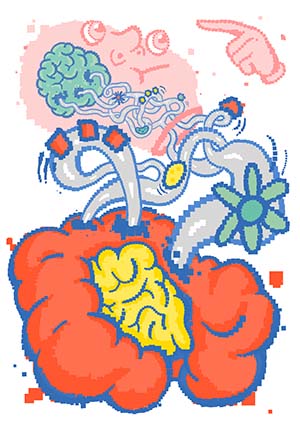Happy guts

Whether you are cheerful or depressed depends in part on your intestines and their billions of inhabitants. ‘It's like there’s a conversation taking place between your brain and your intestines’, says Assistant Professor Sahar El Aidy. ‘The triangle of intestinal bacteria, intestines and brain influences our immune system, our mood and our behaviour, among other things.’
You could say that our intestines are our second brain. The intestines are the only organ in our body with its own nervous system, including a network of nerve cells about as complicated as the neural network inside our spinal cord. So, it is no coincidence that our small intestine is no less than 6 metres long and lined with around 300 m2 of mucous membrane. An interesting playground.
The intestines and the brain are able to communicate using semiochemicals and nerves. It is gradually becoming clearer that this communication is not only about peristalsis and other intestinal functions, but also about behaviour, for example. And that the two kilogrammes of intestinal bacteria which, together with other micro-organisms such as yeasts and viruses, form the microbiome, regularly join the conversation.
The bacteria inside our intestines are also capable of breaking down medication for Parkinson's disease, as Sahar El Aidy and her research group discovered. This led to a publication in Nature Communications early this year. It is one example of the influence of our intestinal flora on the rest of our body. ‘That influence goes even further: the triangle of intestinal bacteria, intestines and the brain impacts our immune system, our mood and our behaviour, among other things.’
Diseases
‘There are many diseases that seem linked to the intestines and intestinal bacteria’, says El Aidy. ‘While that makes sense for inflammatory intestinal diseases, such as Crohn's disease and colitis, brain-damaging diseases such as Parkinson's and Alzheimer's disease and behavioural disorders such as ADHD also seem to be related to our microbiome.’ Unfortunately, knowing this is not the same as remedying it. ‘That link is easy to establish by comparing the intestinal bacteria in the faeces of healthy people to those in the faeces of people who have one of these disorders. However, that doesn't tell us whether the differences in the microbiome are causing the disease or whether they are the result of it.’
Triangle
El Aidy is originally from Egypt, where she is a guest lecturer at various universities. However, she enjoys working in Groningen: ‘Its cultural diversity makes Groningen a wonderful city to live and work in. It offers all sorts of opportunities for development, both in and outside the university.’ El Aidy is a UG Rosalind Franklin Fellow and heads a multidisciplinary research group: ‘Thanks to the open atmosphere in our group, where everyone is willing to work together, we can solve some pieces of the microbiome – intestine – brain triangle puzzle.’
Parkinson's disease
‘We have two research streams, one of which studies the effect of the microbiome on medication. We have demonstrated, for example, that certain bacteria produce enzymes that break down medication for Parkinson's disease. If we can find a way to show whether these enzymes are produced by the microbiome, we can predict the appropriate dose for each patient, depending on the composition of their microbiome. This will make it possible to find the right balance between an effective dosage and minimal side effects for each patient.’ El Aidy believes that more medicines are profoundly affected by the intestinal flora.
The other research stream in El Aidy's group studies the effect of the intestinal bacteria on the immune and nerve cells in the intestines. ‘These cells communicate directly with the brain’, says El Aidy, ‘as if the brain and the intestines are having a conversation. The composition of the microbiome and our nutrition can have a significant influence on that conversation.’
Stress babies
Many studies have shown that the intestinal bacteria influence the conversation between the brain and the intestines. It turns out that intestinal bacteria use substances such as serotonin, dopamine and noradrenaline to communicate with each other. These are the same neurotransmitters that our ‘regular’ nervous system uses to communicate, and that profoundly affect our mood. This communication between the bacteria may therefore directly affect our nervous system and our mood.
Another example is stress among mothers of newborns. The first intestinal bacteria of a baby stem from the mother's vaginal bacteria, and researchers have shown in mice that mothers who experience stress immediately before giving birth have babies with anomalous microbiomes. Although the composition of the intestinal bacteria normalizes with age, these mice continue to respond differently to stress.
Faecal transplant
Researchers have also succeeded in turning frightened mice into brave mice and shy mice into sociable mice, merely by influencing their microbiome. The transplant of human faeces into a rat's intestines even made the rat depressed.
In human subjects, scientists have demonstrated that adding a certain species of bacteria to a diet can affect brain activity and suppress fear. In short, there is no lack of evidence that the microbiome affects our brain and our behaviour. However, how exactly intestinal bacteria, the intestines and the brain influence each other remains a mystery for now. We still don't know what exactly constitutes a healthy microbiome, how exactly communication takes place, and how to influence this communication.
The importance of fibre
‘We don't just want to understand how the microbiome affects our brain’, says El Aidy. ‘In the end, of course, we want to be able to influence the microbiome itself, to alleviate disease.’ This does not always require medication. ‘There is a lot we can do through nutrition. Fibre, for example, turns out to be important for a healthy microbiome, whereas too much sugar causes it to deteriorate.’ We therefore need to be careful what we eat. What exactly constitutes the ideal diet, El Aidy can't say. ‘That varies from person to person because it depends on an individual’s microbiome. We should in any case avoid eating too much artificial and fast food.’
Antacids
In addition to nutrition, medication can have a great impact on our intestines. ‘The widely used PEP inhibitors – antacids – that are being prescribed for heartburn as well as the side effects of other medication, turn out to affect the microbiome. Of course, people sometimes need to use these products, but caution is in order.’ For, if one thing is clear from all of the studies, it is that nutrition and medication can affect our microbiomes and thus our intestines, our mood and our behaviour. The better we understand this relationship, the more we will be able to improve our health, including through nutrition.

Sahar El Aidy
Sahar El Aidy gained her Bachelor's degree in Pharmaceutical Science from Alexandria University in Egypt and her Master's degree in Cellular and Molecular Biology from Wageningen University, where she also took her PhD.
She subsequently worked for University College Cork in Ireland and the Nestlé Research Centre in Lausanne, Switzerland.
Since 2015, she has been an assistant professor and Rosalind Franklin Fellow at the University of Groningen.
| Last modified: | 19 March 2020 11.19 a.m. |
